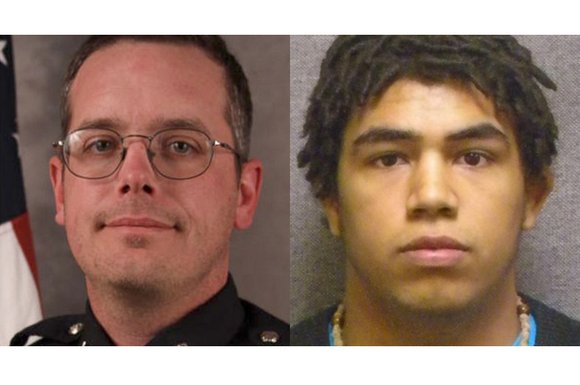No charges filed against Wisconsin police officer in teen’s death
Jeremy M. Lazarus | 5/15/2015, 11:37 a.m.
A Wisconsin police officer who fatally shot an unarmed biracial teenager in March, prompting several days of peaceful protests, will not be charged, a prosecutor said Tuesday.
Officer Matt Kenny used justified lethal force in the March 6 shooting of Tony Robinson, 19, Dane County District Attorney Ismael Ozanne said.
Mr. Ozanne said Officer Kenny shot Mr. Robinson after the teen struck him in the head and tried to knock the officer down a staircase.
“I conclude that this tragic and unfortunate death was the result of a lawful use of deadly police force and that no charges should be brought against Officer Kenny,” Mr. Ozanne said in a 25-minute statement, during which he repeatedly mopped his face with his handkerchief.
The shooting in Wisconsin’s capital city is one of a number of recent officer-involved deaths that have led to increased scrutiny of police use of force in the United States, particularly against young black men.
The prosecutor’s announcement came days after the U.S. Justice Department announced a civil rights investigation into the Baltimore Police Department’s use of force to determine if there are patterns of discriminatory policing.
After days of peaceful protests, riots and looting broke out mostly in West Baltimore over the April 19 death of Freddie Gray, 25, who died after suffering a severe spinal injury while in police custody. Baltimore’s chief prosecutor has charged six police officers in Mr. Gray’s death.
Mr. Ozanne said he was sorry for Mr. Robinson’s death and shares concerns of many Americans about racial profiling by law enforcement officers. He described himself as biracial like Mr. Robinson, and said he also has worried about being singled out by police because of the color of his skin.
He became Wisconsin’s first black district attorney in 2010. In 2014, he ran for attorney general of the state, but finished third among three candidates.
He comes from a family with a deep history in advocating for civil rights.
His mother, Gwen Gillon, was the youngest member of the Student Nonviolent Coordinating Committee during the 1964 Freedom Summer, a campaign to register as many African-Americans as possible in the Deep South to vote.
He recalled his mother’s background with pride at Tuesday’s press conference.
Mr. Ozanne said his mother “went throughout Mississippi registering people to vote, knowing she could lose her life.”
Officer Kenny’s attorney said the decision was appropriate, while Mr. Robinson’s family members expressed disappointment.
Several hundred demonstrators marched from the gray house where Mr. Robinson was shot to the state Capitol Building after the announcement, singing gospel songs and carrying a street-wide “Black Lives Matter” banner.
At the end, Mr. Robinson’s mother, Andrea Irwin, said, “I’m not the type to be defeated. I’m just beginning to fight.”
Mr. Ozanne said Officer Kenny was responding to emergency calls reporting that a man was beating up people and dodging traffic in the street. Three 911 calls came from Mr. Robinson’s friends saying they were afraid of him because he was on drugs and acting violently and could not be controlled.
Mr. Ozanne said Officer Kenny went into an apartment building to catch up with Mr. Robinson. The officer went up the stairs where he encountered Mr. Robinson leaving a unit. The teen approached and struck the officer in the head, Mr. Ozanne said.
Reeling and struggling to keep his balance on the steps, Officer Kenny fired after Mr. Robinson advanced on him again, Mr. Ozanne said. Mr. Ozanne said the officer feared he could be knocked out and that Mr. Robinson could get his gun and create more havoc. The officer fired seven times, fatally wounding the teen, Mr. Ozanne said.
An autopsy later determined the teenager had taken mind-altering drugs, including psilocybin mushrooms, marijuana and the psychoactive drug Xanax, Mr. Ozanne said.
There were large, but orderly demonstrations in Madison after Mr. Robinson’s shooting. The city of 240,000 people is nearly four-fifths white and 7 percent African-American, according to U.S. Census figures.
Last year, Mr. Robinson pleaded guilty to armed robbery and was put on probation. Sentencing documents show it was his first brush with the law, and he was not the armed person in the group that committed the robbery.
Officer Kenny has been on paid administrative leave during the investigation. In 2007, he was involved in another fatal shooting that also was found to be justified.
After Mr. Ozanne spoke, Mr. Robinson’s grandmother, Sharon Irwin, said she had wanted the case to go to trial.
“All I want is due process — for 12 people to decide. Change must come or we are going to go down together,” she said.
Attorney Jon Loevy, who represents Mr. Robinson’s family, said the announcement left many unanswered questions. Turin Carter, Mr. Robinson’s uncle, said the teen was unfairly demonized.
“This was a 19-year-old kid whose life was cut short before he could fully realize his potential,” Mr. Carter told a news conference.
Bishop Harold Rayford, president of the African American Council of Churches in Madison, said organizations have “to continue to work with law enforcement so that if this happens again, things will be handled differently.”







